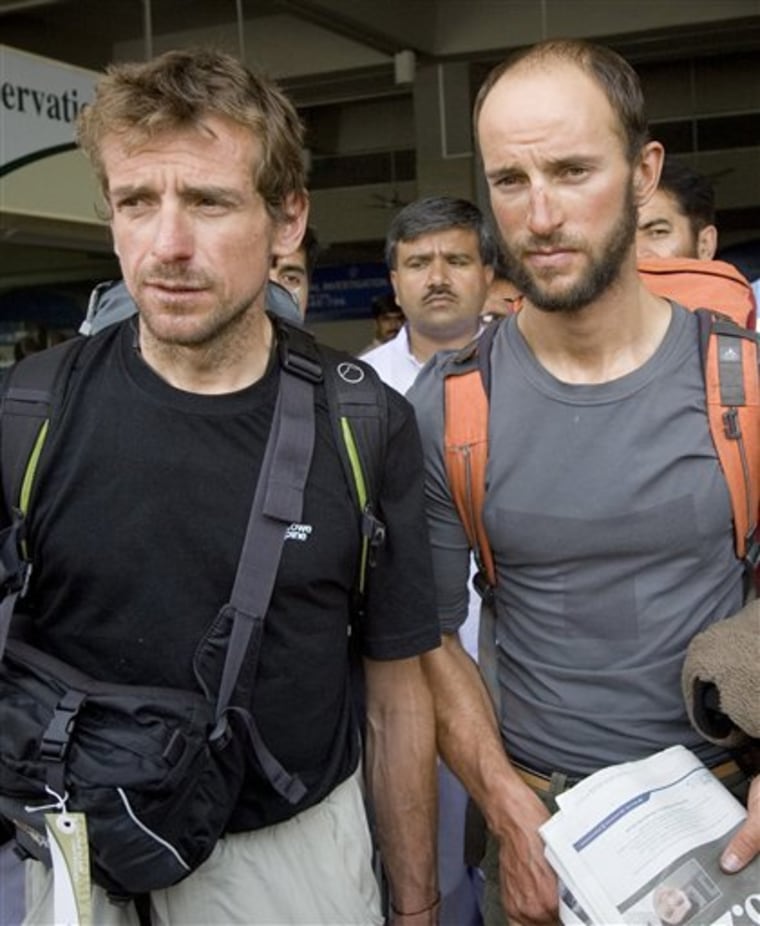Karl Unterkircher, one of the world's top mountaineers, died when a bridge of snow masking a crevasse on Pakistan's "Killer Mountain" gave way under his tentative step, his surviving colleagues said Friday.
Unterkircher, a 37-year-old Italian, was picking his way up a daunting, uncharted route on the 26,810-foot Nanga Parbat on July 16 when the accident occurred.
Pakistani military helicopters this week staged a high-risk rescue operation for his two stranded colleagues, who on Friday gave a sometimes anguished account of their brush with death.
Rescuers said the three Italians had scaled a treacherous 6,500-foot overhanging wall of rock and ice and were picking their way across a shoulder of the mountain where a series of crevasses lay buried by debris falling from higher slopes.
"Karl was just a few meters (yards) from us" when the snow suddenly gave way beneath him, Simon Kehrer told a news conference in the Pakistani capital. "In that moment, Karl just vanished from view."
Walter Nones, the third climber, lowered Kehrer by rope into the frigid crevasse, where he dug with his hands until he found Unterkircher's body.
"The ice is as hard as concrete and he fell about 15 meters (50 feet) and poor Karl had more than one meter (three feet) of snow on top of him. It's not hard to understand" that he didn't survive, Kehrer said.
Shocked and shorn
Maurizio Gallo, an experienced Italian climber who rushed to the area to help guide the survivors down the mountain, said the trio had not been roped together at the time in order to save time.
"In the circumstances, it was more dangerous to be slow than to climb without a rope," Gallo said.
Shocked and shorn of their experienced leader, the pair rested a whole day while mulling what to do.
With rock and ice falls making the face of the mountain too dangerous to re-descend, the pair decided to climb on to 23,000 feet to find a safer route down.
As bad weather hampered their progress, rescuers, alerted by the last call before the battery of their satellite phone gave out, were able to locate their tents high on the mountain.
Rescue at 'Killer Mountain'
Pakistani army helicopters, flying at their operational limit because of the lack of oxygen in the air, at first could only drop food, bottled gas and another phone to them.
Stripped of all nonessential equipment to lighten their load, the helicopters were a "spiral of light which raised our spirits and encouraged us to make it home," Nones said.
The pair were eventually plucked off the mountain on Thursday and are to fly out of Pakistan for Italy on Sunday.
Unterkircher, a professional mountaineer who served with elite Italian Alpine troops, was trying to pioneer a new route up Nanga Parbat, the world's ninth highest peak.
It is known as "Killer Mountain" because many climbers have died trying to scale it.
The summit was first conquered by Herman Buhl of Germany in 1953, after 31 people died attempting to climb it. In 1970, Guenther Messner died on the mountain while climbing with his brother Reinhold Messner, a world-famous Italian alpinist.
In 2004, Unterkircher clocked a world record for the fastest ascent, in 63 days, of both Mount Everest and K2 without oxygen. Two years later, he was the first to conquer the 20,500-foot Mount Genyen in China.
'We are in God's hands'
Kehrer and Nones thanked their rescuers and expressed sorrow for the loss of their friend, who leaves behind a wife and three young children in Italy's northern Val Gardena valley.
However, they said mountaineering was a passion that still had a hold on them and that they would like to return to Pakistan and other parts of the Himalayas.
Kehrer shrugged off a question about whether he felt the expedition had endangered other people unnecessarily by saying he too took part in mountain rescue operations.
"Every day we risk our lives, here or anywhere else," he said. "We are in God's hands."
